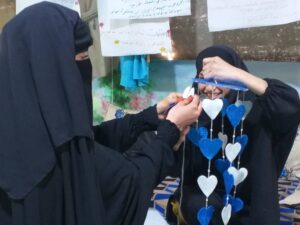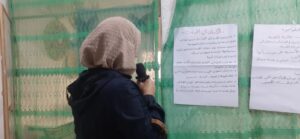Executive Summary
This paper, commissioned by the Global Fund for Women, offers an overview of common challenges and opportunities for collaboration and effective partnership among feminist and women’s organizations (FWOs) in Syria. Overall, 92 individuals participated in consultations, providing data on the work of 76 different organizations and groups in major regions across Syria and in Gaziantep, Turkey.
The majority of FWOs in Syria emerged after the 2011 revolution which provided a space for organic and grassroots organizing, triggering a move towards wider civic engagement. They are largely motivated by solidarity with their fellow women and by their awareness of gender inequality. In-country FWOs’ spaces are constantly contested and closely monitored by political and military authorities.
FWOs have highlighted particular challenges in obtaining legal recognition from local authorities or having any form of umbrella protection. Direct threats to safety and security are also common forms of power exercised over women activists. Security concerns have caused many organizations to work undercover and stop documenting their work. This results in women’s work going, yet again, undocumented and invisible. Other challenges include the existing societal gendered attitudes and relations which are also reflected in the structure of civil society organizations.
FWOs’ internal dynamics are characterized by the following main divides: pro/anti-regime; secular/religious-Islamic; ethnic Arab/Kurd; the geographical and social divide; and the generational gap. Furthermore, some factors that influence the spaces available for FWOs are those related to freedom of movement and control over resources. Most of the spaces available for FWOs remain highly influenced and reliant on the support of national and international organizations. For that reason, running a sustainable and self-sufficient organization is very difficult to achieve for most FWOs. Reliance on funding is inherent to civil society in Syria due to dire needs, inflation, and scarcity of resources.
Moreover, while funding is crucial, it can also include disadvantages such as the NGO-ization of feminist and women’s collectives, pre-set agendas, the nature of the funding, and unattainable criteria. Hence, the relationship between FWOs and their donors is an unequal one. International actors have great influence over local actors, leaving local actors with less agency to provide their insight or in implementing their preferred method of collective action. Another common challenge to both feminist work and the coordination towards feminist and women’s movement building is co-option by organizations that are neither feminist nor women-led.
Despite challenges, women have created and claimed their own spaces, changing gender stereotypes and gaining the recognition they deserve for their vital roles in society. They have introduced and maintained feminist knowledge production as well as continuing their role in service provision and attending to a variety of needs in society today. Where women’s spaces are contested by security apparatus, FWOs come together to support one another and set an example of feminist solidarity.
All participating FWOs agreed on the urgency of developing practical steps for effective collaboration and movement building. For example, in-country FWOs identify the coordination between FWOs as a simultaneous priority, challenge, and opportunity. So far, the networking method used by local organizations has been reliant on informal personal relations rather than structural organizational connections. There is hope for wider unification, however, as it remains in the FWOs’ interests to bridge gaps and embrace difference as a strength.
Overall, four major issues were identified as priorities by the FWOs. These include: change in legislation regarding gender sensitivity and effectiveness; change of social norms and attitudes – from both women and men – regarding gender equality and women’s rights; economic empowerment and financial independence; and gender knowledge production.
Recommendations
Financial and technical support
- Funding plans that are strategic, flexible, needs-assessments-based, and involve power mapping.
- Processes related to program design, planning, and implementation on a participatory level, involving grassroots feminists and women as the experts of their individual and community needs.
- Core and strategic funding to ensure financial security and enable the scope of strategies beyond project-based activism.
- Inclusive, context-sensitive funding criteria.
- Verification for the eligibility of funding beyond the conditions set by political and armed institutions and to consider, otherwise, limitations for FWOs to access the platforms and resources available in their local context.
- That donors understand the specific needs of FWOs. The type of support most generally needed today is technical and organizational (despite dire needs on the grounds, relief projects are not the priority of in-country FWOs). This includes support to enhance strategic planning and movement building, advocacy, mobilization, dialogue, and trust-building with funding parties and among FWOs in Syria.
Knowledge production
- Investment in gender research and current contextual studies in the areas raised by FWOs. Here, gender issues are at the center of knowledge production.
- Increase in research and assessments on each of the points raised in this paper.
- Enable FWOs’ access to local and international experiences and advice in their own language (Arabic/Kurdish or other).
- Make terminology and language more accessible.
- Increasing ways of circulating and providing knowledge and expertise.
- Developing channels to enable the exchange of knowledge and expertise between FWOs – to strengthen their work and enable FWOs to collaboratively build on lessons learned.
- Support space for non-results-based meetings, for women and feminists to discuss their differences and socio-political viewpoints. This aims to encourage positive internal dynamics and collaboration within the women’s movement.
- All mentioned points should be available in local languages.
Unifying discourse
To build and expand the feminist and women’s movement in Syria, it is essential to have a unifying inclusive discourse that all can relate to and identify with. FWOs need to discuss and clarify the basics of feminist concepts and open up spaces for discussions to negotiate priorities and navigate different socio-political stances.
- An inclusive discourse should include the participation of all of society’s members, including rural and displaced communities, those of lower socioeconomic status and educational background as well as other marginalized groups.
- A culture of acceptance should be fostered, diminishing the categorical divides of ‘the other’ and ‘us/they’ in binary opposition – to integrate different feminist approaches and strengthen the connection among feminist and women’s collectives.
- Attempts should be made to reshape the narrative in public knowledge and discourse – to combat gender stereotypes and bias in the narrative around women’s experiences and roles in society. This involves engagement with media on a local, regional and international level.
Communication, trust, and accountability
- Develop effective, secure systems that facilitate communication between different FWOs in Syria or abroad and include differing groups (such as religious and secular FWOs).
- Create safe spaces developed on trust for FWOs to meet and (a) engage in in-depth discussions on sensitive and controversial topics (b) reflect and discuss their values (c) build relationships that are based on redistribution of power (d) develop a common vision and finally (e) develop an intersectional narrative that acknowledges women’s agency regardless of identity politics.
- Create platforms that help map existing and emerging feminist and women’s initiatives and collectives and document their work. This would serve as a reference to local, transnational and international actors.
- Promote complementary rather than competitive work to enhance the relationship of FWOs to the wider movement.
Strategic efforts for collaboration between religious and secular women’s organizations
- Increase dialogue between secular and religious segments within the women’s rights movement, contributing to the strengthening of a broad and heterogeneous women’s movement.
- Seek analytical tools to address women’s issues, highlighting the varying grounded realities experienced by women with different backgrounds and in different contexts.
- Collaborate with local partners and approach women’s issues gradually and as an integral part of other challenges, including poverty and political injustices.


